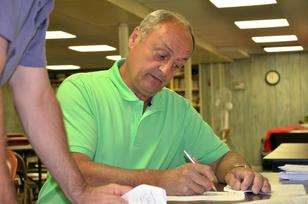This position will focus primarily on providing technical assistance to manufactured housing communities throughout Southeastern New England (Eastern and Central Massachusetts, Eastern Connecticut, and Rhode Island). The successful candidate will be enthusiastic, a good communicator, a self-starter, ready to learn, able to travel and work on some evenings and weekends. The housing program work is full-time (40 hrs/week). A new hire may also have the option of supplementing this work by taking on fee-for-service cooperative development projects that the Cooperative Development Institute is working on outside of the NEROC program.
See job description below. Interested candidates should send a cover letter and resume with references to info@cdi.coop. This position will remain open until filled.
Job Title: Housing Program Organizer (Full Time).
Reports to: Executive Director, Housing Program Manager
Base Salary Compensation: $35-45,000 plus benefits (Exempt)
Full-time Position: 40 hours/week
Position Overview: Aids the Housing Program Manager in organizing manufactured home park residents to form cooperatives to purchase and manage their communities; provides training and assistance to existing resident-owned manufactured home communities, both individually and in groups; helps members understand their roles and responsibilities in order to more effectively manage their resident owned community; fosters a sense of empowerment and community spirit.
Housing Program Organizer
Essential Job Functions
1. Assists Housing Program Manager with community organizing and technical assistance to resident owned manufactured housing communities; includes door-to-door canvassing, community meetings and presentations, mailings, and incorporation assistance.2. Assists in resident association board meetings, including preparation, agenda setting, running efficient meetings, follow-up, and review of minutes and financial statements.
3. Provides organizational and administrative assistance to the Housing Program Manager to ensure that the various elements of the Housing Program are running smoothly; includes meeting facilitation, fundraising assistance, and fulfilling reporting requirements.
4. Provides direct support and organizational training to cooperative board members, committees and residents. 5. In each developing co-op,
o trains committee and facilitates the production of Bylaws.6. Contributes to the development and implementation of workshops for board and community members on range of topics including: board and members’ roles and responsibilities, working in teams, infrastructure and planning for the future, community building, motivating volunteers, corporate finances and communication.
o trains committee and facilitates the production of Community Rules.
o trains committee and facilitates the approval of membership committee policies and procedures, as well as policies for general governance of Associations.
7. Assists both established and developing resident-owned communities with all aspects of their financial and loan compliance responsibilities.
8. As needed, assists struggling cooperatives to assess their organizational health, identify problems, and develop goals and a plan of action.
9. Other tasks and special projects, as assigned by the Program Manager.
Organizational Expectations:
1. Responsible for conducting all activities within the prescribed policy and budgetary guidelines as set by the Board and administered by the Executive Director.2. Functions as a participant in CDI's Cooperative Development Team, sharing information effectively to assist others in doing CDI's work. Builds positive and strong relationships with other CDI staff.
3. Demonstrates personal responsibility in job performance.
4. Responsible for role modeling professional standard of behavior. Takes this role within the organization, is consistently respectful and professional with staff and clients.
5. May be required to perform additional, related duties or functions of lesser or greater responsibility as negotiated to meet the ongoing needs of the organization.
Minimum Requirements
1. 3 to 5 years of cooperative business experience, including project management experience in for-profit, non-profit community or economic development organizations.2. Experience with group facilitation, coaching a group through an autonomous decision-making process, and coping with conflict situations.
Knowledge Skills/Abilities
1. Advanced degree in related field welcomed, minimum of Bachelors degree or equivalent.2. Strong knowledge of fiscal management, strategic planning and general business practices.
3. Working understanding of budgeting, real estate and financing.
4. Strong knowledge of and commitment to cooperatives and cooperative development.
5. Well-developed partnership, process development and integration and planning skills.
6. Familiarity with public policy process and development.
7. Excellent communication skills, including public speaking, consensus-building and facilitation skills.
8. Proactive and team-oriented leadership required.
9. Ability to think critically and solve problems creatively with small and large groups.
10. Demonstrated experience working effectively on a team.
11. Demonstrated success in community building and organizing.
12. Excellent interpersonal and negotiation skills.
13. Demonstrated experience in working remotely/independently.
14. Computer literacy required.
15. Ability to work with diverse groups of residents as well as town and state officials, attorneys, engineers, and other professionals.
16. Available evenings and occasional weekends.
17. Ability to travel.
18. Experience with cooperative governance structures and working with boards of directors preferred.
19. Experience with meeting process, property management, or contractor negotiations a bonus.
Characteristics
1. Well spoken and articulate.2. Calm demeanor; able to perform under pressure during difficult interpersonal conflict.
3. Plans ahead, able to complete tasks and meet tight deadlines.
4. Able to understand and manage multiple complex tasks.
5. Works collaboratively, self-motivated, flexible, enthusiastic.
In accordance with Federal law and the U.S. Department of Agriculture policy, this institution is prohibited from discrimination on the base of race, color, national origin, sex, age, or disability. (Not all prohibited bases apply to all programs.) To file a complaint of discrimination write USDA, Director, Office of Civil Rights, 1400 Independence Avenue S.W., Washington, D.C. 20250-9410, or call (800) 795-3272 (voice), or (202) 720-6382 (voice and TDD).



